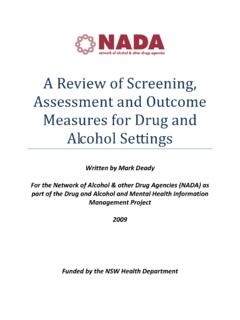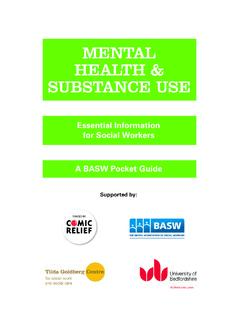Transcription of Motivational Interviewing Brief Guide - Drugs and Alcohol
1 A Brief Guide to Motivational Interviewing Gary Latchford Clinical Psychology Training Programme, Leeds Institute of Health Sciences, University of Leeds. Department of Clinical & Health Psychology, St James's' University Hospital, Leeds. Year 3 Motivational Interviewing Workshop March 2010 Keeping well in CF depends crucially, of course, on an individuals adherence. No matter how effective a treatment, if a patient or family struggles to adhere they will not receive the full benefit. It s important for us to realise that even though we may get to know our patients well, the main job of managing CF takes place away from our clinics and hospitals. The time we have with our patients, then, is an opportunity to influence how they manage outside of the clinic. Although it can be frustrating to work with someone who is struggling and feels difficult to influence, if we use our time wisely it is possible to make a real difference.
2 This Guide looks at ways of making good use of this time. Motivational Interviewing (MI) is a therapeutic strategy for facilitating behaviour change. This approach has built up a solid evidence base for effectiveness, and has been applied to a variety of people with different problems, including adherence. We feel that MI may offer some useful resources for busy CF clinicians. About the authors Dr Gary Latchford Gary Latchford received a PhD from the University of Edinburgh in 1989 where he studied under Professor Colwyn Trevarthen, and completed clinical training in Leeds in 1991, since which he has worked with people with chronic illness, particularly CF, Renal Failure and Diabetes. He is currently Research Director for the Doctor of Clinical Psychology programme at the University of Leeds and consultant clinical psychologist at the Leeds teaching hospitals NHS trust. His clinical and research interests are around coping with chronic illness, the use of MI in physical health settings and the process of change in psychotherapy.
3 He has published several book chapters and peer reviewed articles, and is an accredited trainer in Motivational Interviewing and Client Directed Outcome Informed Psychotherapy. Dr Alistair Duff Alistair Duff qualified as a clinical psychologist from Leeds University in 1994 and shortly after moved to St James s University Hospital to work with children and families living with chronic conditions, namely cystic fibrosis, asthma, renal disease and diabetes. From 1997, he specialised exclusively in CF and respiratory disease, developing a specialist interest in adherence to treatment, procedural distress, neonatal screening and transplantation. He has published several articles on these issues and is engaged in further research. He became Head of Psychology Services for Leeds Teaching Hospitals in 2007 and was awarded an Honorary Senior Lectureship at the University of Leeds. He continues to be actively involved in supervision, teaching and training, and research.
4 Adherence Health professionals are often very worried for those under their care who are not adhering; concerned for the risks they are taking and often feeling responsible for not being able to help. Why do some people struggle so much with adherence? Actually, a better question might be why do so many people not struggle with adherence? After all, many healthy behaviours such as dental flossing or avoiding fatty foods are much less difficult to adhere to than the treatment regimen in many conditions and yet so many in the general population struggle with them. Our starting point, then, is that adherence can be tricky. This doesn t mean that we accept it if people don t adhere without trying to intervene, but it does mean that if we are to stand a chance of influencing people so that they have better adherence we need to know what s going on. We know that adherence in a whole variety of medical conditions is poor (time and again research has indicated that 30 50% of patients with chronic conditions do not take their medicines as directed).
5 It does depend a little on how we define adherence for example keeping to all the treatment recommendations every day without fail versus having some fully adherent days and other poorly adherent days. Patterns of non-adherence can actually have important effects. In general, most people with chronic conditions that require an active treatment regimen are only partially adherent. So what affects rates of adherence, and what can be done about different causes? We suggest a general framework below, but it is inevitably crude compared to the complexities of the individual - in reality there is, of course, no substitute for talking to someone to find out their own individual circumstances. MI: a Brief Guide Potential problems Lack of knowledge Sometimes people are genuinely unsure about what they need to do. Although it may have been explained in the past, it s wise not to assume that this necessarily means that the information has been understood.
6 Research has clearly shown that there are helpful and unhelpful ways of conveying information information exchange would be a good way of giving someone information tailored to their situation - more on this below. Remember, too, that there are many reasons that people may not ask for clarification they may not realise that they have misunderstood, or may be too embarrassed or shy to ask, for example. Problems putting adherence information into practice. Sometimes a patient may agree on the need to improve adherence but not be sure how to make changes in practice. They need to find a way to incorporate treatment into their daily routines, and find ways around possible barriers. Problem solving approaches may be ideal in helping someone find a solution. Problems taking on board the importance of adherence Sometimes a patient may not appear to be aware of the importance of improving adherence.
7 Occasionally this may be lack of knowledge but is often more complex - you may find that just providing information has little or no effect. Instead, many patients find themselves in the situation in which they have poor adherence and when they think about this it generates such anxiety that they try not to think about it, which means in turn that change becomes unlikely. This vicious circle can continue for years, and poor adherence behaviours become part of a daily routine. In such situations the best way forward is to engage the patient in a conversation about this, and to help them consider their options (to change or stay the same). Motivational Interviewing is a good way to do this, and ensures that thoughts about changing and improving adherence become a central part of the conversation. Deliberately choosing not to adhere. Some patients may make a decision not to adhere, in order to enjoy life in the here and now.
8 Whilst we always have to respect the right of every patient to make their own decisions about their life and their treatment, we also ought to be mindful that it is important that this is an informed decision and that the patient has freely chosen, rather than, for example, felt so afraid of their condition that it has been easier to choose to ignore it. Sometimes people see non-adherence as a way of not letting it beat me , seeing non-adherence as a way of leading a normal life . Again, MI is a good way to have a conversation about this, and revisit this decision, considering good adherence as an alternative way of minimizing the intrusions of the condition into life, and taking control of it. MI: a Brief Guide Tackling adherence and the importance of collaboration Hopefully by now we ve conveyed the key principle that changing behaviour is tricky for most of us, even when we know, deep down, that we should do it.
9 Ironically, this is especially true if we have potentially strong feelings about it or the stakes are high the many dangers of smoking are well known but smokers are ingenious in the ways they can ignore worrying information about it and justify carrying on. Similarly, adherence is obviously a major worry for the patient and family. In order to help, then, you have to build up a relationship of trust. If you haven t got this, then someone is unlikely to be honest with you if they are struggling. Instead, it s likely that they will tell you what they think you want to hear. A good way to think about this is that you develop collaboration with your patient. This doesn t mean that the two sides in the relationship are the same you will have specialist knowledge that may be of vital use to your patient, your patient will have knowledge of what it s like trying to adhere in the real world outside of the clinic.
10 What it does mean is that you trust each other to be open about what s going well and what s not, and that you agree to work together to solve any problems that arise. Your goals are clear and there is nothing wrong with being upfront about them - you want good adherence and for your patient to be medically stable. You need to be mindful that your patient may not be on the same page, however, and patient in your attempts to help them resolve the problems holding them back. Giving information: a Guide to information exchange As we have argued above, sometimes poor adherence is a function of simply being unsure what to do. It is easy to underestimate the skill required in conveying complex information, and the barriers to someone taking on what is required of them. There are many occasions when you may need to give information to a patient. Sometimes you may discover that it is lack of information or a misunderstanding that is contributing to poor adherence.












